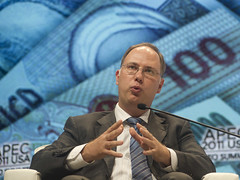| Investment Frontiers Symposia (Photo credit: apec2011ceosummit) |
An Online Brokerage AccountPrior to the advent of the online brokerage, prospective investors had to go through financial intermediaries with access to stock exchanges, otherwise known as brokerage firms. The process, being arduous and costly, was a textbook opportunity for middlemen to step in and lower the transaction costs. In 1969, the creation of the first Electronic Communication Network (ECN) paved the way for online brokerages, revolutionizing the industry forever. ECNs are network systems that automatically match prospective buyers with prospective sellers on an exchange. Today, we see this concept in its modern form in the online brokerage business model.
In spite of the advantages they present, the ease and convenience of online brokerages has fueled an unhealthy addiction to investing. An investor can login to his or her E*trade, Scottrade, TD Ameritrade, Charles Schwab or Fidelity account to make trades for under $10 a pop. Be wary of marketing advertisements on television and the Internet that constantly entice viewers with promises of beating the market and easy riches. All in all, the energy and resources expended through an online brokerage are almost sure to be better spent on an investment in an index or mutual fund.
Day TradingA common symptom of those with an investment addiction is day trading. In the 1990s, many people quit their jobs and emptied their 401k plans to manage accounts with online brokerages. The booming economy of the times made it hard to lose money, but when the bubble burst, countless traders found themselves penniless and out of work. The moral of the story? Being good enough at day trading to make a career out of it is the exception, not the rule. After all, look at guys in the other dugout: high-frequency trading (HFT) computers running incredibly complex algorithms that channel billions of dollars in and out of stocks in milliseconds. If you're into "daily hand-to-hand combat with a bunch of robots," be my guest.
What's more, an active management style for an individual is unproductive for the same reasons that it is dysfunctional institutionally. Over the course of a day of trading, the price of a security may fluctuate dramatically. Attempting to time these fluctuations is impractical, if not impossible. Transaction costs skim dollars and cents off every trade, regardless of the favorability of the outcomes. The success of an investment should be judged over an adequate time horizon, not dictated by the whims of market volatility.
Individual and institutional investors alike have been known to beat themselves when playing the stock market game; it's human nature. Paradoxically, investors tend to sell low and buy high, crippling their returns in the process. When the market goes up, an increasing number of speculative market agents invest in the hopes that the market will continue to do so. Likewise, when the market experiences a pullback, panicked market agents often sell and lock in on their losses. Making coolheaded, rational decisions with your money is difficult, but it does pay off. A common trick is to regularly rebalance your portfolio, thus ensuring that your exposure to any one asset class is minimized.
Stress and InsomniaMonitoring the day-to-day motion of financial markets is proved to be unhealthy. Many studies have shown that a loss is not offset by an equal gain in life: in economic theory, this is known as "loss aversion. " As a result, investors who obsess over the performances of their investment portfolios often undergo emotional trauma that cannot be offset even by a high level of profitability. This kind of needless stress is easily avoided with an investment in a tax-efficient, low fee index or mutual fund, which typically reduces the amount of investment risk.
In Burton Malkiel's "Random Walk Down Wall Street," the renowned author claims that an individual's quality of rest is an extremely sound appraisal of his risk tolerance. Malkiel equates different asset classes with varying levels of sleep, such as money market funds with a sound night's sleep, emerging market portfolios with the occasional nightmare, and gold with insomnia. While certainly exaggerated, Malkiel makes a good point: only assume risk that you are truly comfortable bearing.
Ignoring the Opportunity CostSpending all your time and resources on an investing obsession is also costly from the standpoint of economic theory. Opportunity costs apply to investing as they are the net product of foregone activities that were not chosen in lieu of the ones that were. For example, a vacation to Paris might imply an extremely high opportunity cost in comparison to a vacation to the Bahamas, in terms of the surfing and tanning that was not experienced. People with investing obsessions may endure higher opportunity costs than more patient, composed investors.
Of course, a fixation on maximizing the product of each and every activity during a day would be unhealthy. Opportunity costs should, however, have a very real effect on your choices. Time spent trading via an online brokerage could be spent doing significantly more productive things, considering that few day traders can beat an index's performance anyway. An addiction to investing can detract from time spent with family and friends, as well as the opportunity cost of a vacation to the Bahamas.
The Bottom Line
An addiction to investing may be hard to diagnose at first, as many adults either make investments or own a portfolio or securities at some point. The symptoms discussed in this article, however, will help identify the problem and put an end to it before it's too late. In fact, according to Paul Samuelson, "Investing should be more like watching paint dry or watching grass grow. If you want excitement, take $800 and go to Las Vegas."

No comments:
Post a Comment